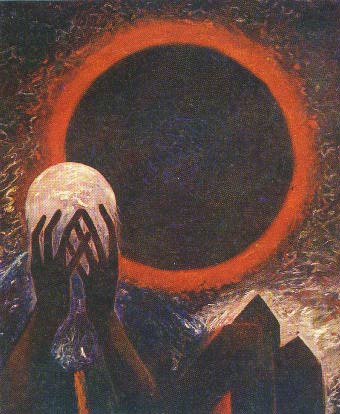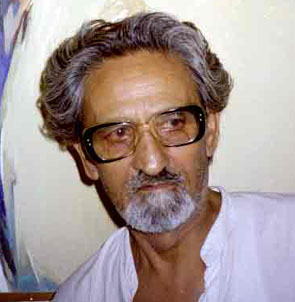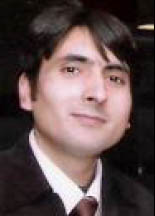Kashmiri
Painters
The
Kashmir school of painting is an obscure topic in the otherwise scholarly
field of Indian art history, although much has been written about the ancient
Kashmiri architecture and sculpture in recent times. It is true that Kashmir
yields no archaeological remains of paintings nor do we know anything regarding
the painting to reorganise the chronological history of painting in Kashmir.
This paucity of archaeological material, of course, poses a severe lacuna
in reorganisation and interpretation of the history of painting of Kashmiri
people in early days but nevertheless it means that painting was an unknown
or omitted discipline of fine arts to the Kashmiri society. An advanced
culture like Kashmir that had well organised style of architecture, sculpture
and other arts would never ignore the art of painting as it has been a
most expressive and lively medium of human feelings and creative impulse.
However, paintings being fragile in nature have completely disappeared
from Kashmir on account of its unsuitable climatic conditions and ravages
of wars. But the paintings created by the medieval artists of Kashmir have
fortunately survived in the Trans-Himalayan region where climate preserved
them. The earliest surviving examples of Kashmiri painting come from Gilgit
which date from about 8th century A. D. Paintings discovered from Gilgit
represent a highly developed style which did not appear overnight. Kashmiri
craftsmen, long-famed in the North Western Indian peninsula, used to be
invited to Central Asia and Tibet to decorate Buddhist monasteries. All
the earliest monasteries of Tibet and Western Tibetan provinces used their
services and their artifacts were in ever greater demand.

References
of paintings in ancient Kashmir literature are very limited and scattered.
It is only by piecing together the literary references and combining them
with sculptural index a picture emerges of plausible form of painting which
corresponds to the paintings that are preserved in the Buddhist temples
of Ladakh and Western Tibet. Ancient Tibetan chronicles register clear
evidences pertaining to the school of painting in medieval Kashmir. Biography
of the great Tibetan scholar Rinchen Sangpo (950 - 1055 A . D.) registers
an important reference that he visited Kashmir three times from Guge to
obtain the services of Kashmiri craftsmen and teachers to reorganise and
re-establish Buddhism in the Tibetan world. He is credited to have built
one hundred and eight temples in Western Tibet with the help of seventy
five skilled Kashmiri craftsmen and painters. In certain stances, name
of particular artist is found. Some of the temples of this epoch have survived
which still preserve the markmanship of those artists who were invited
to build and decorate the temples. Another important information is recorded
by the 16th century Tibetan polygrapher, Lama Taranath who writes in his
"History of Buddhism in India " that when the kings Dharmapala and Devapala
(8th-9th century) were ruling in Eastern India, there flourished two art
schools namely, the Eastern Indian School established by Dhiman and the
Madhyadesha school established by Pritipal son of the former. At the same
time, Kashmir had its own distinct school of painting and metal casting
under Hasuraja. Lama Taranath further comments that the school of Kashmiri
art was influenced by the Madhyadesha school upto some degree. There was
another school localised in Marwar established by Sringadhari which spread
its influence far away in Kashmir, Punjab and in the northwestern provinces,
of India. ... More ...
Source: Kashmir
School of Painting by Dr. A. K. Singh
Source of most of the paintings:
Koshur
Samachar
 Dina
Nath Walli Dina
Nath Walli
The
natural grandeur of the valley had a magic effect on young
Walli's mind who was simply bewitched by the colourful phenomena
pervading throughout the length and the breadth of Kashmir.
Having drunk at the source he worked with a true abandon and
revelled in the ecstasy of his own creative composition.
>>>
|
|
 Manohar
Kaul Manohar
Kaul
Manohar
Kaul's genre is of course varied - except for some portraits.
The painter has struck to his original inspiration, he has been
only true to himself. His is a work only of joy, but perhaps,
joy is the supreme quality in art.
>>>
|
| |
|
|
 Veer
Munshi Veer
Munshi
Veer's canvases present images which are intriguing. They cross average
notions of reality and pass into a surreal realm. Veer Munshi has not only
painted his own experiences of Islamic fundamentalist and terrorist forces
in Kashmir, but has done a yeoman service to depict the overall human
rights situation in Kashmir through his paintings.
>>>
|
|
 Maheshwar
Nath Dhar Maheshwar
Nath Dhar
Being
unknown in the eyes of general people of J&K, nobody was
his teacher. As such it was he himself as was quoted by him.
The inner spirit that guided him along the path "The
voice came from inside", he adds.
>>>
|
| |
|
|
 Kailash
Nath Fotedar Kailash
Nath Fotedar
The painter from Sathoo Bar-Bar Shah locality (paternal grandfather
of the webmaster).
>>>
|
|
 K.
Khosa K.
Khosa
Khosa
born 1940 has been working as a professional painter since 1962. Held ten
solo shows in Delhi, Bombay and Calcutta. Having used ink, pencil and oil,
he has participated in the major national and international exhibitions
bringing him the 'National Award' in 1981 and the President of India's
Silver Plaque in 1974.
>>>
|
| |
|
|
 Kishori
Kaul Kishori
Kaul
Kishori Kaul was born in Srinagar in 1939. Her father was a Kashmiri
Pandit of unorthodox views serving in the Government. She studied in Annie
Besant School, Srinagar. The year 1953 was a year of great significance
for her. She fell ill with tuberculosis and while she lay tossing between
hope and disappointment, her grandfather, Narayan Mu, her grandmother
whose father was Narayan Muratgar, a celebrated painter of the late 19th
century, placed before her brush, colours and paper and thereby set the
ball of aesthetic sensibility rolling in her mind. >>>
|
|
 Ghulam
Rasool Santosh Ghulam
Rasool Santosh
Santosh was born in Srinagar, Kashmir in 1929. He took to many
devotions-painting, weaving, papier-mache and then to kashmiri poetry. For
two years 1954-56, he went to Baroda University on the Government of India
Cultural Scholarship to study under Prof. N.N Bendra. He was awarded Padma
Shree in 1977 and then in 1978 he published a selection of poems in
Kashmiri. >>>
|
| |
|
|
 Triloke
Kaul Triloke
Kaul
Sri Triloke Kaul belonged
to the first generation of artists who formed the Progressive Artists
Association of Kashmir. To his generation belonged the artists like Shri.
P.N. Kachru (Rainawari), Late Sh. Somnath Bhat (from Ganpatyar, first and
foremost a landscape painter), Ghulam Rasul Santosh (who earned a name
through his Tantric style of painting), Sh. Bansi Parimu (from Habbakadal,
a flamboyant and articulating personality, ... >>>
|
|
 Suraj
Tiku Suraj
Tiku
Sh. Suraj Tiku was not only
very interested in painting but also theatre was his passion. He acted in
dramas staged by the first theatre group Kala-Kendra in the beginning at
its Shivalaya stage and later at Tagore Hall, Srinagar. He made set
decoration and painted background scenes for dramas. >>>
|
| |
|
|
 P.N.
Kachru P.N.
Kachru
|
|
 Kapil
Kaul Kapil
Kaul
|
| |
|
|
 Prof. Sant Ji
Sultan Prof. Sant Ji
Sultan
|
|
 Bansi Parimu Bansi Parimu
|
| |
|
|
 Anil
Nakhasi Anil
Nakhasi
|
|
|
| |
|
|
Born, Srinagar - 1938, Gave up
studies at college to join school of arts, Trivandrum, Kerala, Started career
as a craftsman - 1959, started painting - 1965, Visited U.S.A. and Painted -
1980, selected by National Institute of Designs, Ahmedabad for a training
program of "Craft Design"
>>>
|
|
 Naran
Murzgar Naran
Murzgar
His real name was Naranju Kachru and lived through latter part of the
19th and early 20th century. >>>
|
| |
|
|
|
 Rajinder Tiku
Rajinder Tiku
Rajinder Tiku is a famed
sculpture artist of Kashmir.
His contributions to the art of sculpture has received wide acclaim even at the
international level. In recognition of his services, Tiku was recently awarded
the prestigious Pollock Krasner Foundation Grant.
>>>
|
|
 Ashutosh Sapru
Ashutosh Sapru
 Gokal Dembi
Gokal Dembi
 Image Gallery
Image Gallery
|
| |
|
|
 Assorted
Collection of Paintings Assorted
Collection of Paintings
Paintings by Gokal Dembi, Bushan Kaul, Rajinder Tiku, Geeta Das, Janardhan
Bhat Braroo and others.
>>>
|
|
 Kashmir
School of Miniature Paintings Kashmir
School of Miniature Paintings
The
story of art in Kashmir opens with a pre-historic rock drawing
discovered at the Neolithic site of Burzahom depicting a
hunting scene. A subsequent stage of development is
represented by master-pieces of art in the shape of Harwan
tiles and Ushkar (Wushkar) stucco figures.
>>>
|
| |
|
|
 Kashmir School of Painting
Kashmir School of Painting
Paintings being fragile in nature have completely disappeared from Kashmir
on account of its unsuitable climatic conditions and ravages of wars. But
the paintings created by the medieval artists of Kashmir have fortunately
survived in the Trans-Himalayan region where climate preserved them.
>>>
|
|
 The Kashmir Movement -
Founders and Trendsetters
The Kashmir Movement -
Founders and Trendsetters
Writers and thinkers of Kashmir,
as elsewhere in the country, were also trying to establish the status of
art in the region. An organization named "the National Cultural Front" was
founded on the idea and principle of democracy, in November 1947.
>>>
|
|
